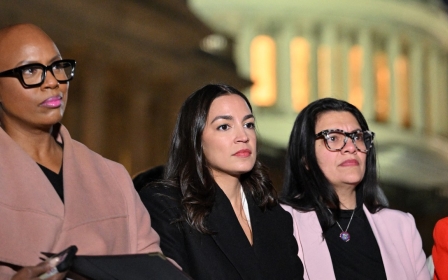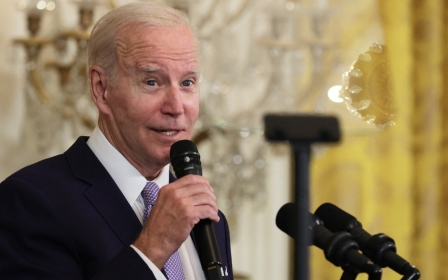Israel-Palestine war: US Congress rules that anti-Zionism is antisemitism

The US House of Representatives has passed a resolution with an overwhelming majority that equates anti-Zionism with antisemitism, sparking backlash from lawmakers, advocates for Palestinians, and progressive Jewish groups who say the measure could restrict free speech rights in the country.
The Republican-led measure "clearly and firmly states that anti-Zionism is antisemitism" and also calls on elected officials to "condemn and fight all forms of domestic and global antisemitism".
The bill is nonbinding and is more of a symbolic measure than one with legal ramifications, but its passing could be used as a precedent to justify other related binding measures.
It passed late on Tuesday by a vote of 311-14, with the following lawmakers voting against it: Rashida Tlaib; Jamaal Bowman; Cori Bush; Ilhan Omar; Gerald Connolly; Jesus Garcia; Raul Grijalva; Pramila Jayapal; Summer Lee; Alexandria Ocasio-Cortez; Ayanna Pressley; Delia Ramirez; Bonnie Watson Coleman; and Republican congressman Thomas Massie.
An additional 92 Democrats abstained by voting "present".
New MEE newsletter: Jerusalem Dispatch
Sign up to get the latest insights and analysis on Israel-Palestine, alongside Turkey Unpacked and other MEE newsletters
Tlaib, the lone Palestinian-American member of Congress, took to social media on Tuesday to say she was opposed to the measure, noting that the bill's language equates criticism of Israeli government policy and pro-Palestinian activism to antisemitism.
"Opposing the policies of the government of Israel and Netanyahu’s extremism is not antisemitic. Speaking up for human rights and a ceasefire to save lives should never be condemned," Tlaib said.
The passage of the bill comes amid a massive wave of pro-Palestinian demonstrations across the country calling for a ceasefire in Gaza, where Israel launched an invasion in response to an attack in southern Israel by Hamas and other Palestinian armed groups on 7 October that killed 1,200 Israelis, according to a government death toll. At least 240 people from Israel were also taken hostage. While some have been released, more than 100 are still being held in Gaza.
Israel responded by launching an aerial bombardment followed by a ground invasion of Gaza that has so far killed more than 16,000 Palestinians, the majority of them being women and children, according to the Palestinian health ministry.
Israel's military campaign has displaced more than one million Palestinians and targeted civilian infrastructure. Hundreds of scholars have warned Israel may be committing genocide against the Palestinians.
The demonstrations against the war in the streets of major US cities and on many university campuses in the country have included a diverse range of people, and many demonstrations have been led by progressive Jewish organisations including IfNotNow and Jewish Voice for Peace.
Follow Middle East Eye's live coverage for the latest on the Israel-Palestine war
Many of these protests have been attacked as being antisemitic, a charge that organisers say is aimed at maligning the protesters' criticisms of Israel's war in Gaza.
In addition to equating criticism of Zionism with antisemitism, Tuesday's measure includes language that utilises the International Holocaust Remembrance Alliance's definition of antisemitism.
The controversial definition was formulated in 2004 by antisemitism expert Kenneth Stern in collaboration with other academics for the American Jewish Committee, a pro-Israel Jewish advocacy organisation founded at the beginning of the 20th century and based in New York.
'Muddying the waters about what antisemitism is, is completely wrong and unhelpful'
- Congresswoman Pramila Jayapal
Critics say some of the examples used in the definition conflate antisemitism with criticism of historical and current policies that led to the creation of the state of Israel in 1948, the expulsion of hundreds of thousands of Palestinians from their homes in modern-day Israel, and continuing human rights abuses against Palestinians and the occupation of Palestinian lands by Israel.
"Falsely stating that anti-Zionism is antisemitism conflates all Jews with the Israeli state and endangers our communities. It fuels deadly violence and censorship campaigns against Palestinians," Jewish Voice for Peace Action, a progressive and anti-Zionist Jewish organisation, said on Twitter about the legislation.
The resolution has caused divisions among members of the Democratic Party, with roughly half of them choosing to either abstain from the vote or vote against the measure.
Congresswoman Pramila Jayapal, the chair of the House Progressive Caucus, said the resolution was "extreme" and inappropriately labels anti-Zionism as antisemitism.
"Muddying the waters about what antisemitism is, is completely wrong and unhelpful," Jayapal said.
Jerry Nadler, a Jewish Democrat who abstained from the vote, condemned the bill and said on the House floor that Republicans have "seemed gleeful at their partisan wedging at the expense of the Jewish community, and they have utterly failed to do anything serious to address this crisis" of antisemitism.
Middle East Eye delivers independent and unrivalled coverage and analysis of the Middle East, North Africa and beyond. To learn more about republishing this content and the associated fees, please fill out this form. More about MEE can be found here.




